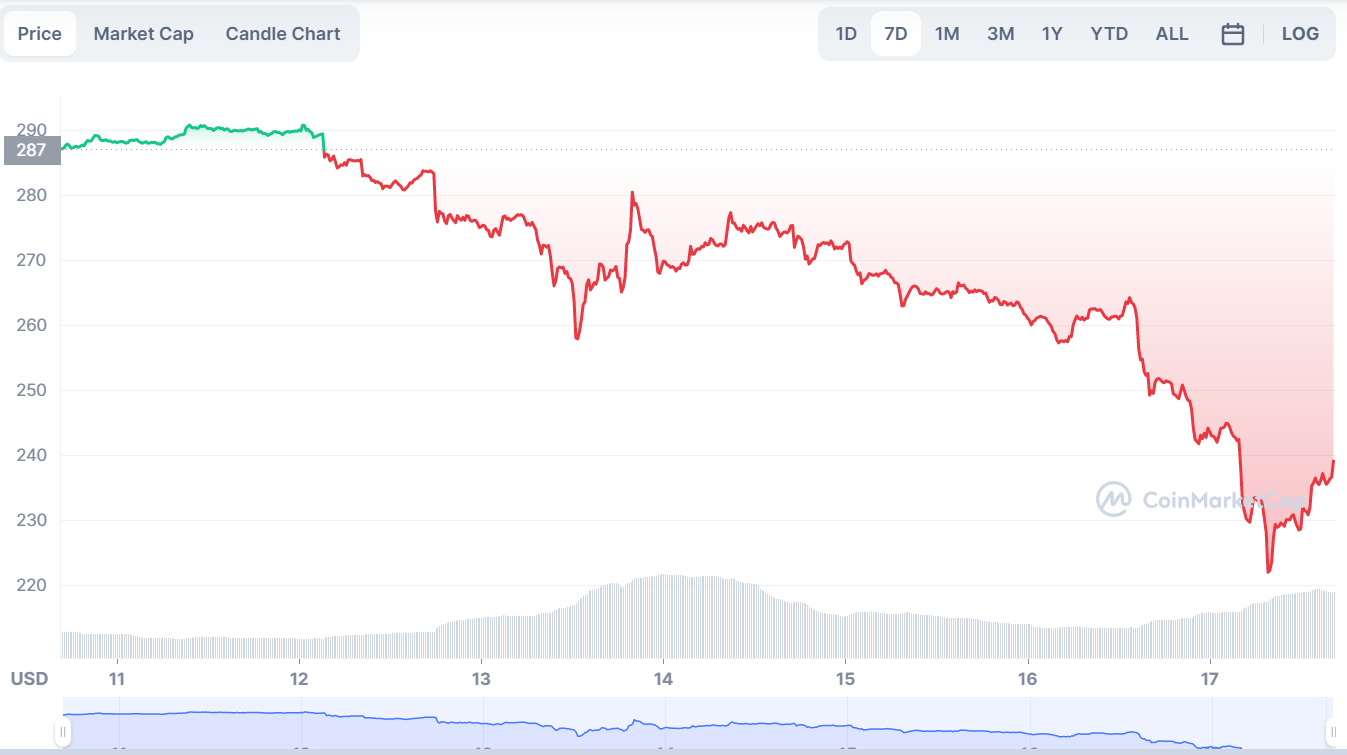BNB Token Falls To Lowest Levels Since July – What Happens To Crypto And DeFi If Binance Fails?

The largest crypto exchange in the world, Binance, is under fire with growing concerns that its CEO Changpeng Zhao’s empire may be built on shaky ground.
Are these wrongful accusations being made against a transparent company, or is Binance another crypto exchange ready to wreak havoc on investors and destabilize the crypto markets?


Interestingly, BNB (CRYPTO: BNB), the native cryptocurrency of Binance, has lost 20% of its value in the last week.
The fifth most valuable cryptocurrency, only behind Bitcoin (CRYPTO: BTC), Ethereum (CRYPTO: ETH), Tether (CRYPTO: USDT), and USD Coin (CRYPTO: USDC), BNB has a market capitalization of around $38.2 billion.
Is It Smoke Without A Fire?
The ongoing bankruptcy proceedings of crypto exchange FTX is one of Binance’s several problems – The company was the first to invest in FTX and last year, Binance received around $2.1 billion as compensation for giving up its equity stake in the company.
Publicly calling out the risks associated with owning the FTX Token (CRYPTO: FTT), Zhao played a key role in forcing FTX into insolvency, resulting in massive losses for investors and customers of the platform.
Despite Zhao being a vocal supporter of transparency and hiring the auditing firm Mazars to verify Binance's proof of reserves, investors began withdrawing their money from the crypto exchange.
Mazars, which has now deleted Binance's proof-of-reserves assessment, stated they, “make no statement regarding the appropriateness” of its work for the crypto exchange, adding that its report does not “express an opinion or an assurance conclusion.”
The Mazars report only focused on Binance’s Bitcoin holdings and liabilities. Yet, it did not expand the scope of its audit to any of the many other cryptocurrencies held and traded on Binance.
“Had we performed additional procedures, other matters might have come to our attention that would have been reported,” the auditors wrote in their statement.
The crypto community has discovered that crypto CEOs are about as reliable as conventional corporate CEOs after being assured that funds were secure on Celsius, Voyager, and FTX by their chief executives.
Also read: Auditing Firm Mazars Group Suspends Work With Crypto Clients: Report
Regulators Considering Action Against Binance
Another concern for Binance is potential action by the U.S. Department of Justice (DOJ).
According to Reuters, the DOJ is contemplating whether to charge Binance and Zhao with unlicensed money laundering conspiracy, unlicensed money transmission, and criminal sanctions violations.
Halting USDC Withdrawals
Binance's decision to stop USDC withdrawals from the platform is another worrisome sign for the company.
The fastest way to undermine client confidence is to deny them the ability to withdraw their money, especially in the case of USDC, which is seen as one of the safest crypto assets.
This, according to Binance, is the result of a token swap. However, this action may not inspire trust in Binance among any investors who have money parked on the exchange.
Why Binance Can Still Win
Investors' faith in crypto exchanges is at its lowest since 2017, with people realizing keeping their crypto on centralized platforms may not be in their best interests.
Despite investors withdrawing their assets, Binance still has sufficient reserves and while Mazar’s audit may not be perfect, there are no obvious red flags in the company’s balance sheet.
Furthermore, unlike the covert relationship between FTX and Alameda Research, the Binance CEO does not manage a hedge fund connected to his crypto exchange.
An incident worth noting is the attack on the Binance Smart Chain, which was the target of a $570 million hack in October. In contrast to other exploited platforms, Binance made sure that customers were made whole.
Irreparable Harm To DeFi If Binance Collapses
The DeFi ecosystem may get hit with irreparable harm if Binance falters and the BNB cryptocurrency sinks.
The Binance Smart Chain serves as a more affordable DeFi option, while Ethereum is designed for DeFi users who can afford to pay transaction fees in ETH that are equal to USD.
BSC far surpasses Ethereum's transaction volume. Imagine the effect if all these DeFi early adopters were eliminated, since BNB pairings would no longer be valuable.
Conclusion
Even though the purpose of cryptocurrency is to become more decentralized, it is ironic that centralized actors pose the biggest threats.
Asserting that Binance cannot collapse like FTX would be infallible however, Binance outperforms FTX in terms of leadership, balance sheet (and war chest), along with counterparty risk.
Next: Analysis: Will Binance Succumb To Crypto Market Fears?
Photo: Courtesy of Shutterstock.




